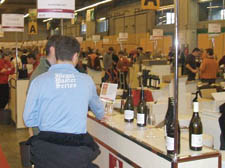|
|
 |
| |
 Les Vignerons Indépendants de France: a giant warehouse of wines Les Vignerons Indépendants de France: a giant warehouse of wines |
Sweet taste of success and retail sour grapes
Following last week’s look back at two years’ searching for a decent quaff, Don and John reveal how the wine that makes it to your table is controlled by extremely unpalatable ‘market research’
IT was a crisp Sunday morning in late November and we had just spent an enjoyable few hours walking from the centre of Paris to its southern outskirts.
Here, in a giant exhibition centre, more than 1,000 members of Les Vignerons Indépendants de France and their wines had set up shop.
Their motto – one man, one winery, one wine – was clearly out of date. There were lots of women, and several of the winemakers we spoke to owned one vineyard but managed others on behalf of absentee owners, some of them British.
Nevertheless, compared to the giant companies whose mass-produced industrial wines dominated the shelves in London, these guys were small fry. After a year of searching, we had finally found what we were looking for: farmer winemakers who produced wine on a human scale.
They were equivalent of the pioneering English farmers who were setting up shop in special markets located inside numerous English towns and cities.
The streets around the centre were a hive of activity. A constant stream of vans and cars loaded up with wine. Thousands of pedestrians, many pulling trolleys packed with wine, disappeared into the Metro.
We had attended big tasting events in London and they all followed the same formula: hundreds of wines from numerous countries lined up side by side, most similar in style and even grape content. There are usually dozens of Chardonnays, Cabernets, Merlots and Pinots and many blends. The objective is to taste your way through each varietal and choose your favourites. Old hands have nicknamed these events beauty contests.
Here in Paris the set-up was different.
There were, of course, Chardonnays from Burgundy and the South of France and Cabernet blends from Bordeaux, but mostly there was originality. Each one of the hundreds of winemaking areas present in the hall had its own grape varietals, or a singular blend. Some even had their own unique style of wine production.
A bewildering range of wines offered the shopper a huge diversity of choice and a taste of differing wine cultures and long-established local traditions. These French farmers, most of whom were making wine on a few acres of land, delivered a far greater choice then that available in any UK supermarket – including Waitrose.
Some of them had tried to break into the UK wine market, mostly without success. Over the coming months, we contacted hundreds of importers and retailers and, where possible, spoke to supermarket and chain store wine buyers in an effort to discover why these wines were denied access to the British consumer. The answer was always the same – UK wine sales were consumer-led, whereas it was the producer who dominated French wine-making. The French had to adapt to modern consumer-led retailing.
But if these wines have never been on the supermarket shelves, how and when has the consumer made this choice, we asked?
Again, a stock response: the industry uses an array of modern, highly scientific market research methods to ascertain consumer tastes in wine. This information is used to decide which types of wine should be stocked.
Allied with sophisticated mass marketing aimed at the British wine-drinker, this approach has been highly sucessful and has helped create the fastest growing wine market in the world.
The same market research techniques had shown that consumers wanted cheap food and were not overly bothered by the quality of the ingredients or the origins of the product.
The past two years of shock and scandal on the food shelves has proved this to be spectacularly incorrect. Currently, consumers regard supermarkets and the food industry with deep suspicion.
The wine industry has been lucky; the dependency of wine writers on the industry has saved winemaking from the harsh journalistic scrutiny turned on food producers. |
 |
|
| |

|
|
 |
|
 Les Vignerons Indépendants de France: a giant warehouse of wines
Les Vignerons Indépendants de France: a giant warehouse of wines







